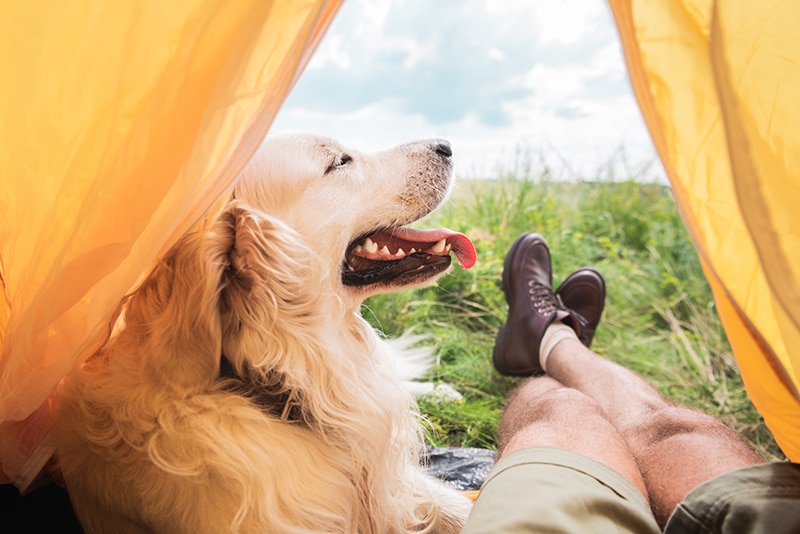Can Dogs Get Poison Ivy Too?

In the vast expanse of nature, an unseen peril lurks: poison ivy and oak. People have always been cautious of poison ivy and poison oak because they can cause blisters.
But can these plants affect dogs, too? Find out how poison ivy allergies can affect our pets and how to prevent them from spreading to us. Let's explore ways to keep our furry friends safe.
Can Dogs Get Poison Ivy?
Dogs, like humans, can indeed experience the adverse effects of poison ivy due to their exposure to urushiol, the plant's irritating oil. However, allergic reactions are not as common in dogs as in humans.
Understanding Transmission Dynamics
Urushiol, the culprit behind poison ivy's notorious reputation, adheres to dog fur upon contact with the plant. As dogs explore their surroundings, they unwittingly become carriers of this potent allergen, capable of triggering allergic reactions in both canines and humans.
The Curiosity of Canines
Dog’s curiosity often leads them to investigate their environment. This innate curiosity increases the likelihood of encountering substances like poison ivy, heightening the risk of exposure to urushiol.
How Does Poison Ivy Spread?
Urushiol can transfer from a dog's fur to various surfaces, including other dogs, humans, and inanimate objects. Consequently, unsuspecting individuals may come into contact with the allergen, culminating in allergic reactions.
Symptoms of Poison Ivy in Dogs
Symptoms of poison ivy exposure in dogs often include intense itching, redness, swelling, and possibly even blisters or hives in the affected area. In severe cases, dogs may experience difficulty breathing or swelling around the face and eyes. If you suspect your canine companion has encountered poison ivy, seek veterinary care promptly to alleviate discomfort and prevent further complications.
Can You Get Poison Ivy from Your Dog?
Dogs can have urushiol on their fur without knowing it. This substance can cause humans to get poison ivy if they come into contact with it. This can happen when people touch the dog directly or touch something the dog has touched. Petting a contaminated dog or handling items exposed to urushiol can cause allergic reactions in humans.
Mitigating Transmission Risks
Take proactive measures to minimize the spread of poison ivy. Using cleansers like Tecnu Detox Wipes on your pet after a hike or being outside can drastically prevent them from spreading urushiol to you and your home.
The Impact of Poison Ivy on Canines
Skin Reactions
Like humans, dogs can experience skin reactions upon exposure to poison ivy. Skin irritation, redness, itching, and scratching are common symptoms, potentially leading to secondary infections and discomfort.
Gastrointestinal Concerns
Ingestion of urushiol can result in gastrointestinal distress in dogs. Vomiting and diarrhea may ensue. If you think your dog may have consumed poison ivy, contact your vet immediately for guidance.
Breed Vulnerability
Some dog breeds, especially those with shorter hair or thinner coats, are more likely to have allergic reactions to poison ivy. Limited protection against urushiol contact renders these breeds more vulnerable to skin complications.
Protecting Your Canine Companion
Proactive Measures
- Leash Restraint: Keep your dog on a leash during outdoor activities to prevent direct contact with poison ivy-infested areas.
- Immediate Cleansing: In case of suspected exposure to poison ivy, promptly use Tecnu Detox Wipes to remove urushiol from your dog's fur.
- Comprehensive Washing: Employ Tecnu Original Outdoor Skin Cleanser to thoroughly cleanse your dog's fur post-outdoor activities, minimizing the risk of transmission to humans.
Ensuring Safety
For dog owners and outdoor enthusiasts, having poison ivy cleansers like Tecnu on hand is essential. Taking proactive steps to prevent allergic reactions is crucial, especially in rural areas where poison ivy is prevalent. Whether you're a resident or a visitor, carrying specialized poison ivy cleaners is a smart precaution against potential encounters with this troublesome plant.




